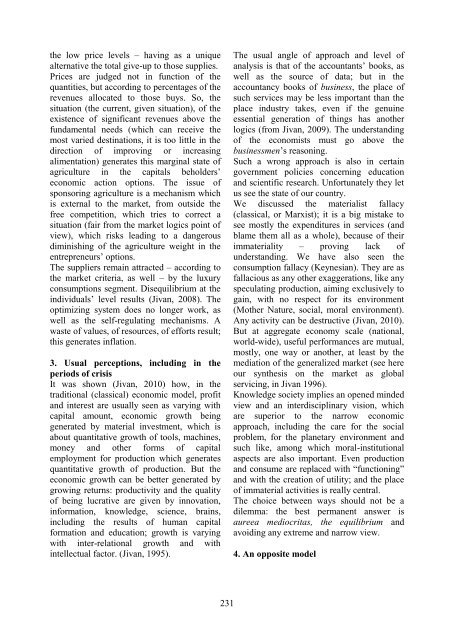Selected papers~ SPECIAL EDITION - Index of
Selected papers~ SPECIAL EDITION - Index of
Selected papers~ SPECIAL EDITION - Index of
You also want an ePaper? Increase the reach of your titles
YUMPU automatically turns print PDFs into web optimized ePapers that Google loves.
the low price levels – having as a unique<br />
alternative the total give-up to those supplies.<br />
Prices are judged not in function <strong>of</strong> the<br />
quantities, but according to percentages <strong>of</strong> the<br />
revenues allocated to those buys. So, the<br />
situation (the current, given situation), <strong>of</strong> the<br />
existence <strong>of</strong> significant revenues above the<br />
fundamental needs (which can receive the<br />
most varied destinations, it is too little in the<br />
direction <strong>of</strong> improving or increasing<br />
alimentation) generates this marginal state <strong>of</strong><br />
agriculture in the capitals beholders’<br />
economic action options. The issue <strong>of</strong><br />
sponsoring agriculture is a mechanism which<br />
is external to the market, from outside the<br />
free competition, which tries to correct a<br />
situation (fair from the market logics point <strong>of</strong><br />
view), which risks leading to a dangerous<br />
diminishing <strong>of</strong> the agriculture weight in the<br />
entrepreneurs’ options.<br />
The suppliers remain attracted – according to<br />
the market criteria, as well – by the luxury<br />
consumptions segment. Disequilibrium at the<br />
individuals’ level results (Jivan, 2008). The<br />
optimizing system does no longer work, as<br />
well as the self-regulating mechanisms. A<br />
waste <strong>of</strong> values, <strong>of</strong> resources, <strong>of</strong> efforts result;<br />
this generates inflation.<br />
3. Usual perceptions, including in the<br />
periods <strong>of</strong> crisis<br />
It was shown (Jivan, 2010) how, in the<br />
traditional (classical) economic model, pr<strong>of</strong>it<br />
and interest are usually seen as varying with<br />
capital amount, economic growth being<br />
generated by material investment, which is<br />
about quantitative growth <strong>of</strong> tools, machines,<br />
money and other forms <strong>of</strong> capital<br />
employment for production which generates<br />
quantitative growth <strong>of</strong> production. But the<br />
economic growth can be better generated by<br />
growing returns: productivity and the quality<br />
<strong>of</strong> being lucrative are given by innovation,<br />
information, knowledge, science, brains,<br />
including the results <strong>of</strong> human capital<br />
formation and education; growth is varying<br />
with inter-relational growth and with<br />
intellectual factor. (Jivan, 1995).<br />
231<br />
The usual angle <strong>of</strong> approach and level <strong>of</strong><br />
analysis is that <strong>of</strong> the accountants’ books, as<br />
well as the source <strong>of</strong> data; but in the<br />
accountancy books <strong>of</strong> business, the place <strong>of</strong><br />
such services may be less important than the<br />
place industry takes, even if the genuine<br />
essential generation <strong>of</strong> things has another<br />
logics (from Jivan, 2009). The understanding<br />
<strong>of</strong> the economists must go above the<br />
businessmen’s reasoning.<br />
Such a wrong approach is also in certain<br />
government policies concerning education<br />
and scientific research. Unfortunately they let<br />
us see the state <strong>of</strong> our country.<br />
We discussed the materialist fallacy<br />
(classical, or Marxist); it is a big mistake to<br />
see mostly the expenditures in services (and<br />
blame them all as a whole), because <strong>of</strong> their<br />
immateriality – proving lack <strong>of</strong><br />
understanding. We have also seen the<br />
consumption fallacy (Keynesian). They are as<br />
fallacious as any other exaggerations, like any<br />
speculating production, aiming exclusively to<br />
gain, with no respect for its environment<br />
(Mother Nature, social, moral environment).<br />
Any activity can be destructive (Jivan, 2010).<br />
But at aggregate economy scale (national,<br />
world-wide), useful performances are mutual,<br />
mostly, one way or another, at least by the<br />
mediation <strong>of</strong> the generalized market (see here<br />
our synthesis on the market as global<br />
servicing, in Jivan 1996).<br />
Knowledge society implies an opened minded<br />
view and an interdisciplinary vision, which<br />
are superior to the narrow economic<br />
approach, including the care for the social<br />
problem, for the planetary environment and<br />
such like, among which moral-institutional<br />
aspects are also important. Even production<br />
and consume are replaced with “functioning”<br />
and with the creation <strong>of</strong> utility; and the place<br />
<strong>of</strong> immaterial activities is really central.<br />
The choice between ways should not be a<br />
dilemma: the best permanent answer is<br />
aureea mediocritas, the equilibrium and<br />
avoiding any extreme and narrow view.<br />
4. An opposite model


